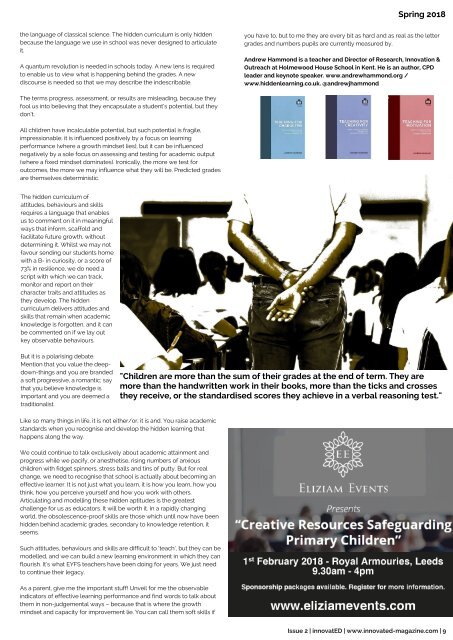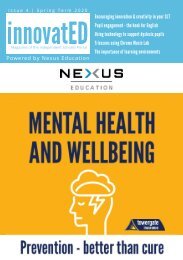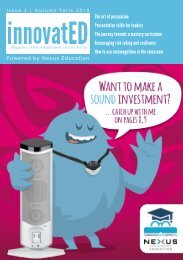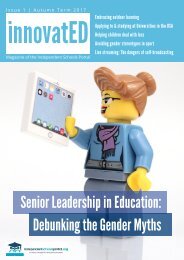innovatED - Issue 2
You also want an ePaper? Increase the reach of your titles
YUMPU automatically turns print PDFs into web optimized ePapers that Google loves.
Spring 2018<br />
the language of classical science. The hidden curriculum is only hidden<br />
because the language we use in school was never designed to articulate<br />
it.<br />
A quantum revolution is needed in schools today. A new lens is required<br />
to enable us to view what is happening behind the grades. A new<br />
discourse is needed so that we may describe the indescribable.<br />
you have to, but to me they are every bit as hard and as real as the letter<br />
grades and numbers pupils are currently measured by.<br />
Andrew Hammond is a teacher and Director of Research, Innovation &<br />
Outreach at Holmewood House School in Kent. He is an author, CPD<br />
leader and keynote speaker. www.andrewhammond.org /<br />
www.hiddenlearning.co.uk. @andrewjhammond<br />
The terms progress, assessment, or results are misleading, because they<br />
fool us into believing that they encapsulate a student’s potential, but they<br />
don’t.<br />
All children have incalculable potential, but such potential is fragile,<br />
impressionable; it is influenced positively by a focus on learning<br />
performance (where a growth mindset lies), but it can be influenced<br />
negatively by a sole focus on assessing and testing for academic output<br />
(where a fixed mindset dominates). Ironically, the more we test for<br />
outcomes, the more we may influence what they will be. Predicted grades<br />
are themselves deterministic.<br />
The hidden curriculum of<br />
attitudes, behaviours and skills<br />
requires a language that enables<br />
us to comment on it in meaningful<br />
ways that inform, scaffold and<br />
facilitate future growth, without<br />
determining it. Whilst we may not<br />
favour sending our students home<br />
with a B- in curiosity, or a score of<br />
73% in resilience, we do need a<br />
script with which we can track,<br />
monitor and report on their<br />
character traits and attitudes as<br />
they develop. The hidden<br />
curriculum delivers attitudes and<br />
skills that remain when academic<br />
knowledge is forgotten, and it can<br />
be commented on if we lay out<br />
key observable behaviours.<br />
Andrew Hammond<br />
Shedding Light On Hidden Learning<br />
But it is a polarising debate.<br />
Mention that you value the deepdown-things<br />
and you are branded<br />
a soft progressive, a romantic; say<br />
that you believe knowledge is<br />
important and you are deemed a<br />
traditionalist.<br />
"Children are more than the sum of their grades at the end of term. They are<br />
more than the handwritten work in their books, more than the ticks and crosses<br />
they receive, or the standardised scores they achieve in a verbal reasoning test."<br />
Like so many things in life, it is not either/or, it is and. You raise academic<br />
standards when you recognise and develop the hidden learning that<br />
happens along the way.<br />
We could continue to talk exclusively about academic attainment and<br />
progress while we pacify, or anesthetise, rising numbers of anxious<br />
children with fidget spinners, stress balls and tins of putty. But for real<br />
change, we need to recognise that school is actually about becoming an<br />
effective learner. It is not just what you learn, it is how you learn, how you<br />
think, how you perceive yourself and how you work with others.<br />
Articulating and modelling these hidden aptitudes is the greatest<br />
challenge for us as educators. It will be worth it. In a rapidly changing<br />
world, the obsolescence-proof skills are those which until now have been<br />
hidden behind academic grades, secondary to knowledge retention, it<br />
seems.<br />
Such attitudes, behaviours and skills are difficult to ‘teach’, but they can be<br />
modelled, and we can build a new learning environment in which they can<br />
flourish. It’s what EYFS teachers have been doing for years. We just need<br />
to continue their legacy.<br />
As a parent, give me the important stuff! Unveil for me the observable<br />
indicators of effective learning performance and find words to talk about<br />
them in non-judgemental ways – because that is where the growth<br />
mindset and capacity for improvement lie. You can call them soft skills if<br />
<strong>Issue</strong> 2 | <strong>innovatED</strong> | www.innovated-magazine.com | 9






